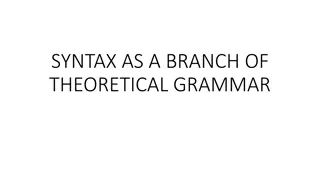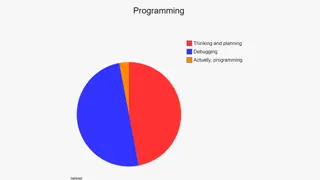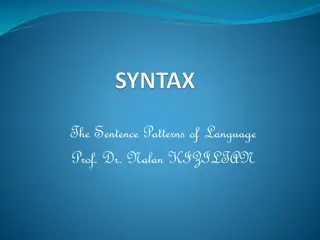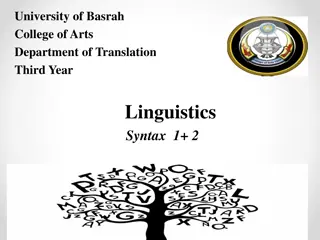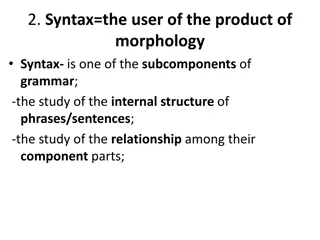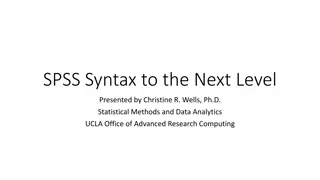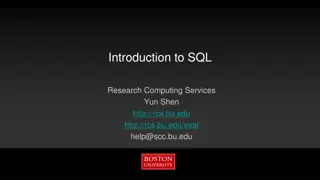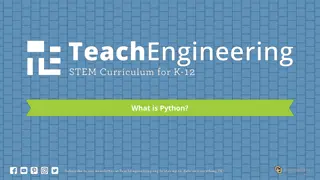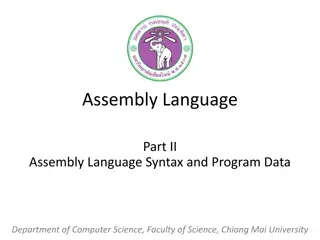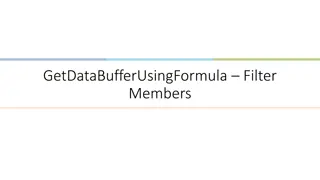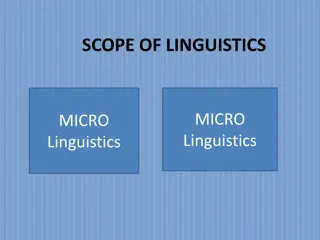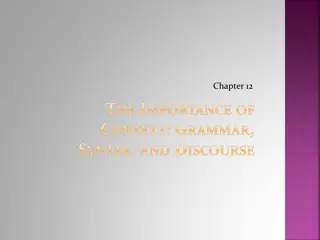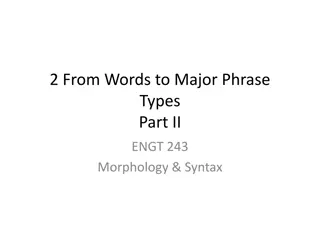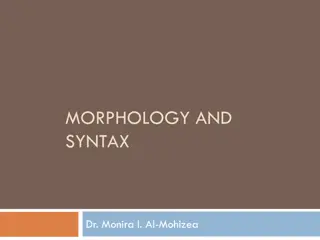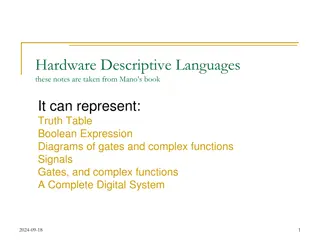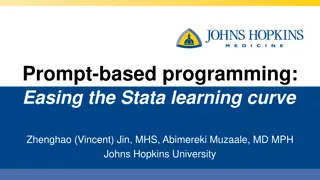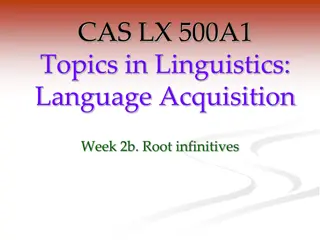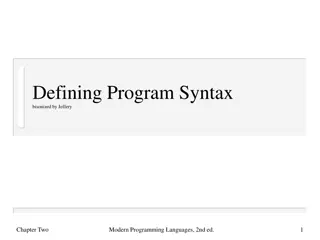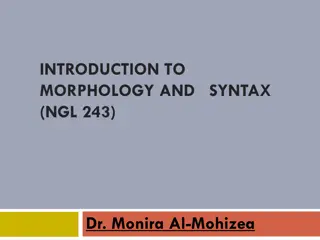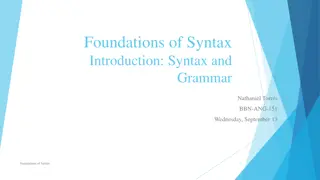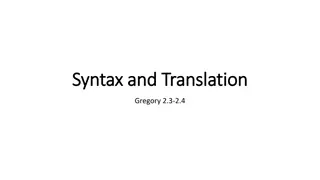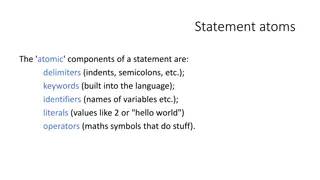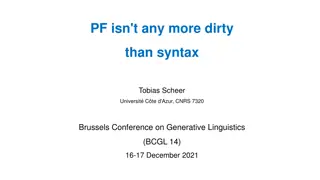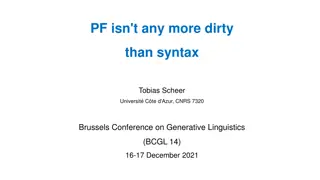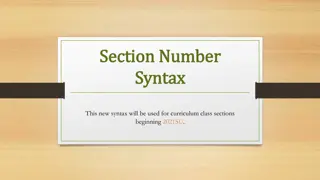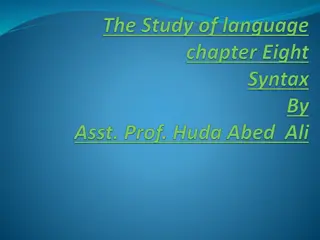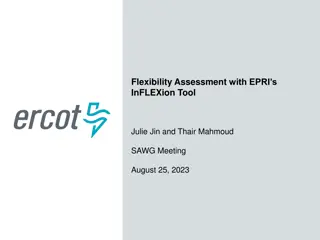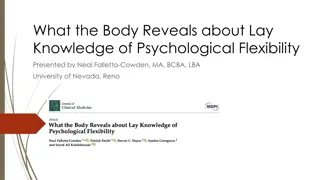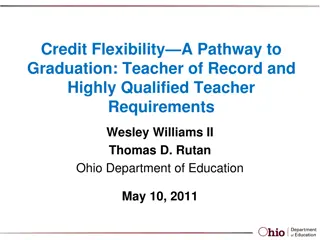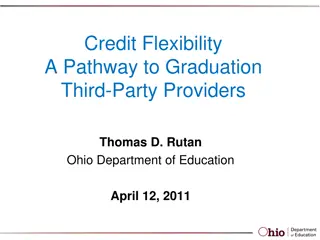Understanding Syntax in Theoretical Grammar
Syntax, as a branch of theoretical grammar, explores the combination of words in phrases and sentences, focusing on their relationships and functions in communication. Basic syntactic notions, such as syntactic units, syntactic meaning, and syntactic relations, play a crucial role in shaping the str
5 views • 17 slides
Understanding Language Syntax Through Syntax Trees
Explore how both programming languages and spoken languages can be parsed into syntax trees, revealing the syntactic structure of sentences. Learn about terminals and non-terminals in syntax trees and how they represent different components of language. Dive into syntax tree abstraction for a deeper
3 views • 32 slides
Understanding Sentence Patterns in Language: A Guide by Prof. Dr. Nalan Kiziltan
Language consists of sentences organized by grammar rules. Syntax plays a crucial role in sentence structure. This guide explores sentence patterns, syntax principles, linear order, and hierarchical structure in language, illustrated with examples and constituent tests.
0 views • 111 slides
Understanding Syntax in Linguistics
Syntax, originating from Greek meaning arrangement, deals with the structure of sentences in a language. Generative Grammar, coined by Noam Chomsky, uses rules akin to mathematics to create new, grammatically accurate sentences. By applying recursion and deep structure analysis, linguists explore th
2 views • 20 slides
Understanding Syntax and Grammar Components
Syntax is a vital subcomponent of grammar that involves studying the internal structure and relationship of phrases and sentences. Grammar components include Lexicon/Vocabulary, Phonological Form, Syntactic component/Grammar, and Logical Form. Constituents are parts that combine to form a whole stru
2 views • 40 slides
Mastering SPSS Syntax for Advanced Data Analysis
Delve into the world of SPSS syntax with this workshop by Christine R. Wells, Ph.D., where you will learn to efficiently work with SPSS commands and subcommands, understand when commands execute, and optimize your data analysis process. Discover insider tips on setting options, using SPSS version 28
2 views • 141 slides
Learn SQL Basics: History, Syntax, and Terminology
SQL (Structured Query Language) is a specialized domain-specific language for managing structured data in relational databases. Developed in the 1970s, it follows a rigid syntax and structure, with specific features like triggers and stored procedures. Understanding SQL history, terminology, and syn
1 views • 38 slides
Understanding Python Programming Basics
Python is a popular high-level programming language known for its simple syntax, making it easy to learn and versatile for various applications. This introduction covers the basics of Python, including variables, objects, classes, and essential syntax rules like defining functions. Dive into the fun
2 views • 12 slides
Understanding Exceptions in Computer Science
Errors in programming, such as syntax, semantic, runtime, and logical errors, can disrupt the execution of a program. Syntax errors relate to grammatical violations, semantic errors occur when statements lack meaning, and runtime errors happen during program execution due to illegal operations. By i
1 views • 35 slides
Introduction to Assembly Language Syntax and Program Data
Learn about the syntax of assembly language and how data, variables, and constants are used in programming. Explore the basic instructions and the translation of high-level language into assembly language. Discover the role of an assembler in translating assembly language programs into machine langu
4 views • 36 slides
Understanding GetDataBufferUsingFormula.Filter.Members Syntax
GetDataBufferUsingFormula.Filter.Members provides a powerful way to filter account-type dimensions efficiently using formulas. This technique allows for precise filtering without the need to loop through individual members. Learn how to apply FilterMembers syntax to enhance data processing and achie
1 views • 6 slides
Overview of Micro and Macro Linguistics
Micro linguistics focuses on the scientific study of speech sounds, word formation, syntax, and meaning within a language, while macro linguistics delves into the societal, psychological, and neurological aspects of language use. Micro linguistic areas include phonetics, phonology, morphology, synta
1 views • 7 slides
Centrica's Flexibility Market Vision for Future Markets: Policy and Industry Developments
Centrica's Regulatory Affairs team shared insights at the Cornwall LEM sign-off event regarding the importance of independent flexibility market platforms to deliver transparency, neutrality, and coordination between DSOs and ESOs. They emphasized the need for updated network security standards, add
0 views • 6 slides
Importance of Flexibility and Stretching for Better Health and Injury Prevention
Flexibility and stretching play a crucial role in preventing injuries, promoting better health, and preparing the body for physical activities. Adequate muscular flexibility allows joints to move efficiently, reducing the risk of compressing tissues or nerves. By incorporating proper stretching tech
0 views • 17 slides
Understanding Grammar, Syntax, and Discourse in Biblical Texts
Explore the significance of context in analyzing grammar, syntax, and discourse in biblical Greek and Hebrew texts. Learn about the foundational elements, word order, Greek syntax basics, and the importance of discourse analysis. Delve into the definitions of grammar, syntax, and discourse, and unde
1 views • 30 slides
Understanding Grammar Structures in Morphology and Syntax
Exploring the relationship between words and major phrase types in English morphology and syntax, this content delves into grammar with lexical categories, constituent structures, and the formation of phrases. It highlights the importance of considering constituents and word grouping for accurate sy
0 views • 35 slides
Understanding Morphology and Syntax in English Language
This content explores morphology and syntax in English language, covering topics like conversion, compounding, and the formation of words through various linguistic processes. It delves into examples of verb-noun conversions, productive word formation methods, and compound words. The discussion also
0 views • 27 slides
Understanding Flexibility and Stretching Techniques
Flexibility is crucial for optimal physical performance and injury prevention. It refers to the ability to move joints through a full range of motion without restrictions. Factors limiting flexibility include tissue elasticity, bony structure, and muscle/tendon extensibility. Understanding active an
0 views • 28 slides
Understanding Flexibility and Joint Health
Flexibility is essential for optimal joint health, allowing for smooth movement and reducing the risk of injuries. Joints, ligaments, muscles, and tendons play crucial roles in supporting flexibility and mobility. Maintaining flexibility through activities like static stretching can promote overall
0 views • 43 slides
Understanding Hardware Descriptive Languages in Digital Systems
Hardware Descriptive Languages (HDLs) are used to represent various aspects of digital systems, including truth tables, Boolean expressions, gate diagrams, and complex functions. They find application in design entry, logic simulation, functional verification, circuit synthesis, timing verification,
0 views • 19 slides
Enhancing Stata Learning with Prompt-Based Programming
Explore the benefits of prompt-based programming in easing the learning curve of Stata software. This innovative approach simplifies syntax, reduces errors, and enhances efficiency for data analysis tasks. By comparing prompt-based versus traditional syntax methods, researchers can improve their ski
1 views • 54 slides
Language Development in Children: Morphology and Syntax Acquisition
Children's language acquisition process involves developing morphology by adding inflectional morphemes to nouns and verbs, such as "-ing" and "-s" for plurals. Overgeneralization occurs as children apply rules, leading to expressions like "foots" and "mens". Additionally, irregular plurals and poss
0 views • 13 slides
Syntax in Language Acquisition: Root Infinitives and Small Clause Hypothesis
Children's syntactic development in language acquisition progresses from one-word utterances to combining words into basic sentences. This stage shows missing elements like tense, subject agreement, and auxiliary verbs. The Small Clause Hypothesis suggests that children initially lack certain struct
0 views • 52 slides
Understanding Programming Language Syntax
This content delves into the fundamental aspects of programming language syntax, covering lexical analysis, syntax rules, and semantics. It also explores how grammar works by building parse trees, providing examples from English grammar and programming languages. The use of Backus-Naur Form (BNF) an
0 views • 43 slides
Understanding Morphology and Syntax with Dr. Monira Al-Mohizea
Explore the fascinating realm of morphology and syntax in language with Dr. Monira Al-Mohizea's insightful guide. Learn about the internal structure of words, morphemes, and the aim of morphology to uncover subconscious knowledge. Delve into discussions on what constitutes a word and various definit
0 views • 19 slides
Essential Rules and Syntax for Naming and Using Variables in Bash Scripting
Learn the fundamental rules for naming variables in Bash scripting, understand the syntax for defining user-defined variables, and discover key considerations for assigning values and working with case-sensitive variables. Make the most of your scripting by following these guidelines closely.
0 views • 27 slides
Understanding the Foundations of Syntax in Language
Delve into the basics of syntax and grammar, exploring the essence of language, syntax rules, morphemes, and morphemic decomposition. Discover how syntax shapes meaningful communication and learn to identify morphemes in English words.
1 views • 17 slides
Understanding Syntax and Translation in Logic
Explore the world of syntax and translation in logic through topics such as forming well-formed formulas, identifying main connectives, De Morgan's Laws, Venn diagrams, necessary and sufficient conditions, and more. Discover the language of logic, vocabulary, truth-functional connectives, punctuatio
0 views • 46 slides
Understanding Statement Atoms and Basic Syntax in Programming
The atomic components of a statement include delimiters, keywords, identifiers, literals, and operators. Basic syntax involves single-line statements, inline and block comments, and compound statements categorized by control flow markers. Different languages have distinct ways of structuring code, s
0 views • 12 slides
Enhancing Cognitive Flexibility for Employability
Cognitive flexibility is a crucial skill for adapting to new situations and problem-solving in today's competitive job market. This module focuses on identifying, assessing, and enhancing cognitive flexibility to nurture competitiveness and employability. Learn how to recognize the importance of cog
0 views • 24 slides
Exploring Minimalism in Linguistics: Dirty PF and Clean Syntax
This text delves into the relationship between syntax and PF (Phonological Form) in the context of minimalism theory in linguistics. It discusses how minimalism aims to achieve clean syntax by discarding imperfect elements, with PF often considered as "dirty" due to its association with phonology. T
0 views • 40 slides
Minimalist Approach to Syntax and Phonology in Linguistics
The discussion delves into the relationship between syntax and phonology in linguistics, emphasizing the minimalist approach that aims to create a clean syntax while considering phonology as an ancillary element. It explores the idea that syntax is central to grammar, while phonology is considered '
0 views • 40 slides
New Syntax for Curriculum Class Sections Starting 2021
Introducing a new syntax for class sections beginning in 2021SU, providing advantages and a table of options for location, delivery method, length of class, section count, and other specific information. The simple format aims to offer visibility and flexibility, enabling staff to build sections eff
0 views • 14 slides
The Relationship Between Cognitive Flexibility and Psychological Flexibility After Acquired Brain Injury
This study explores how cognitive flexibility and psychological flexibility interact after an acquired brain injury. It examines whether individuals who exhibit cognitive inflexibility can achieve psychological flexibility, considering the impact of cognitive impairments post-injury. Cognitive flexi
0 views • 21 slides
Understanding Grammar and Syntax in Linguistics
Grammar and syntax are two fundamental components of language study. Grammar entails rules for correct language usage, while syntax focuses on sentence structures. Deep and surface structures, along with examples and distinctions between active and passive voice sentences, are explored. Structural a
0 views • 21 slides
Overview of Flexibility Study Using EPRI's InFLEXion Tool
The flexibility study aims to assess system flexibility using EPRI's InFLEXion tool for high net load ramp months in 2027. It involves analyzing wind, solar, and load profiles to evaluate flexibility metrics and identify periods of flexibility deficit. The process includes data analysis, production
0 views • 9 slides
Understanding Psychological Flexibility through Embodied Knowledge
Psychological flexibility plays a crucial role in mental well-being and behavior. This study explores whether untrained individuals can grasp psychological flexibility concepts based on body language and how people physically express flexibility or inflexibility in response to challenging situations
0 views • 18 slides
Credit Flexibility: A Pathway to Graduation Web Conference Series 2011
Explore the Credit Flexibility Web Conference Series hosted by the Ohio Department of Education, focusing on topics such as teacher requirements, Highly Qualified Teachers, student credit flexibility plans, and more. The series provides guidance and case studies to support local implementation of Oh
0 views • 26 slides
Credit Flexibility: A Pathway to Graduation - Web Conference Series
Providing guidance and insights on credit flexibility as a pathway to graduation, this web conference series, cohosted with the Great Lakes East Comprehensive Center, offers information on utilizing third-party providers, highly qualified teachers, funding, assessments, physical education, and more.
0 views • 28 slides
Comprehensive Guide to Ontology Editors and IDEs for Ontologies
Explore a wide range of Ontology Editors and Integrated Development Environments (IDEs) for managing ontologies efficiently. From simple text editors to advanced IDEs like Protégé and Web Protege, learn about various tools and syntax options available. Dive into Ontology Editors like Protégé 4.3
0 views • 16 slides
